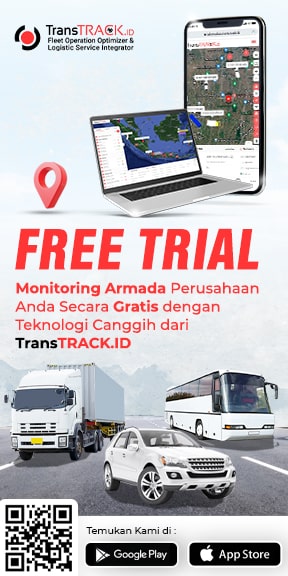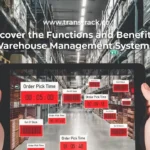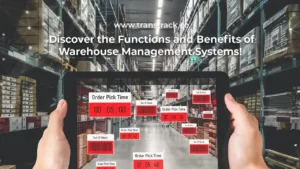Find Out What Route Optimization is, the Benefits and Challenges of Implementing it!
Posted on October 24, 2023 by Nur Wachda Mihmidati

In the world of logistics, route optimization is a key strategy for managing goods delivery trips and company resources efficiently. Optimized routes can help logistics companies overcome various challenges, such as high costs, increasing customer demands, and environmental concerns. In the ever-growing business world, efficiency in planning and delivering goods becomes very important.
This time we will discuss what route optimization is, its benefits, challenges, and when it is best to implement it in your company’s logistics planning. Read the complete explanation in the TransTRACK article below, so that your company is more profitable.
Benefits of Implementing Route Optimization in Logistics Companies
Implementing this optimization has many important benefits for logistics companies. Here are some of the key benefits of implementing route optimization for logistics companies:
Cost Savings
By planning more efficient routes, logistics companies can reduce fuel costs, operational costs and vehicle maintenance costs. This results in significant cost savings in the long term, so that companies can be more optimal in gaining profits.
Increased Operational Efficiency
This optimization also allows logistics companies to allocate resources more efficiently. This can include better setting delivery schedules, more optimal use of vehicles and increasing staff productivity.
Travel Time Reduction
By planning shorter and more efficient routes, logistics companies can reduce the time it takes to deliver goods. This can result in faster delivery to customers.
Improved Customer Service
By optimizing routes, logistics companies can ensure timely and accurate deliveries to customers. Accuracy in delivering these goods will increase your customer satisfaction, so that the company’s reputation will also increase.
Real-Time Tracking
This optimization technology is often equipped with real-time tracking systems, which allow companies to monitor the position of their vehicles while in transit. This real-time vehicle tracking enables rapid response to unexpected changes in the situation.
Better Data Analysis
By using optimization software, companies can collect valuable data about their operational performance. This data can be used to perform further analysis and make continuous improvements.
Attract Customer Interest
Logistics companies that implement route optimization tend to have a greater competitive advantage compared to their competitors. This is because companies can offer more efficient and cheaper services to their customers. This can be a good strategy to win the fierce market competition.
Challenges of Implementing Route Optimization in Logistics Companies
The implementation of route optimization in logistics companies does not always run smoothly. There are several challenges that can be faced during this process. Some of the main challenges in implementing route optimization for logistics companies include:
Planning Complexity
In complex logistics operations, planning routes for multiple vehicles with a number of different delivery points can be a complex task. Implementing this optimization also requires adjustment time with the crew in the field. Implementation that is not in accordance with planning will only bring unexpected problems.
Inconsistent Data Availability
To optimize routes effectively, logistics companies need accurate data about road networks, traffic, customer locations and stock inventory. However, often this data is not always available in a complete or accurate format, so that when implementing route optimization it cannot always run smoothly.
Complex Software
Although there are many route optimization software available, some companies may face difficulties in understanding and operating these software. The company needs to provide training for each employee so that route optimization planning can run well. This may take longer, because the adaptability of each employee will be different.
Fluctuating Road Conditions
The big challenges in logistics are fluctuations in demand and road conditions that can change every day. Poor road conditions, extreme weather conditions, and sudden changes in customer orders can affect the effectiveness of optimized routes.
Limitations of GPS Technology
Even though GPS technology has become more sophisticated, there are still situations where the GPS signal can be lost or inaccurate, especially in rural areas or inside tall buildings. This can certainly interfere with the use of route optimization software, resulting in less than optimal results.
Implementation Costs
Implementing route optimization software, employee training, and infrastructure changes can be significant additional costs for a company. Sometimes, small companies may have difficulty allocating these resources.
Overcoming these challenges requires commitment, investment and adaptation from logistics companies. However, the long-term benefits of implementing route optimization usually far outweigh the challenges faced.
In an ever-changing and competitive world, route optimization is a strategy that can help your company stay competitive and efficient in logistics planning. It’s not just about saving costs, but also about providing better service to your customers.
To help you implement route optimization more efficiently, you can consider using TransTRACK’s Fleet Management System (FMS). FMS is a solution that can simplify vehicle and delivery management, as well as improve route optimization.
TransTRACK’s FMS service provides various features that can help monitor and manage your vehicle fleet better. Some of the key features provided by TransTRACK include real-time fleet monitoring, vehicle performance monitoring, driver behavior monitoring, and data analysis to help you make better decisions in logistics planning.
By integrating FMS with a route optimization system, you can achieve higher efficiency in shipping and logistics planning. Contact TransTRACK now to get a free demo!
Recent Post
Topic :
 Bahasa Indonesia
Bahasa Indonesia









